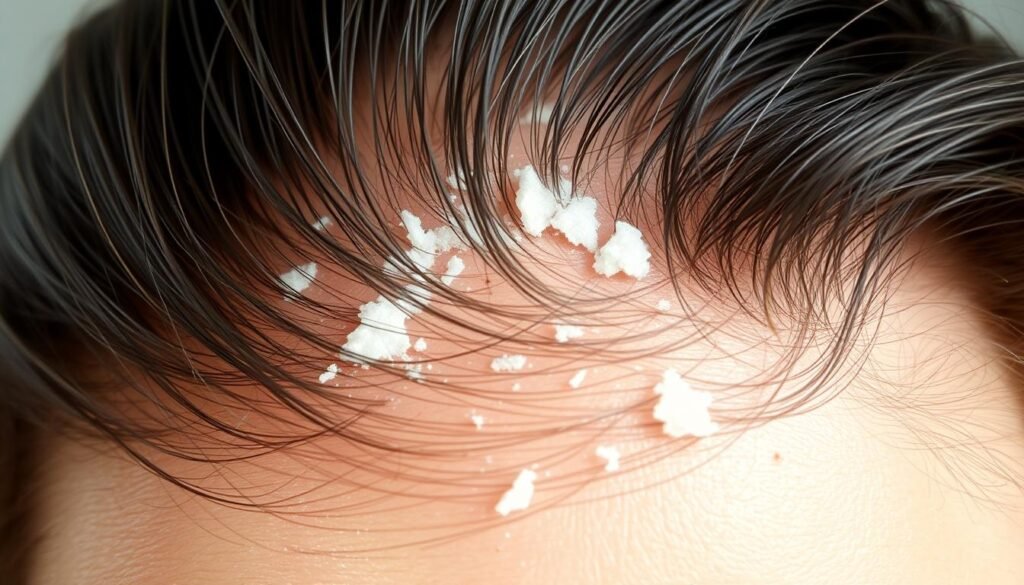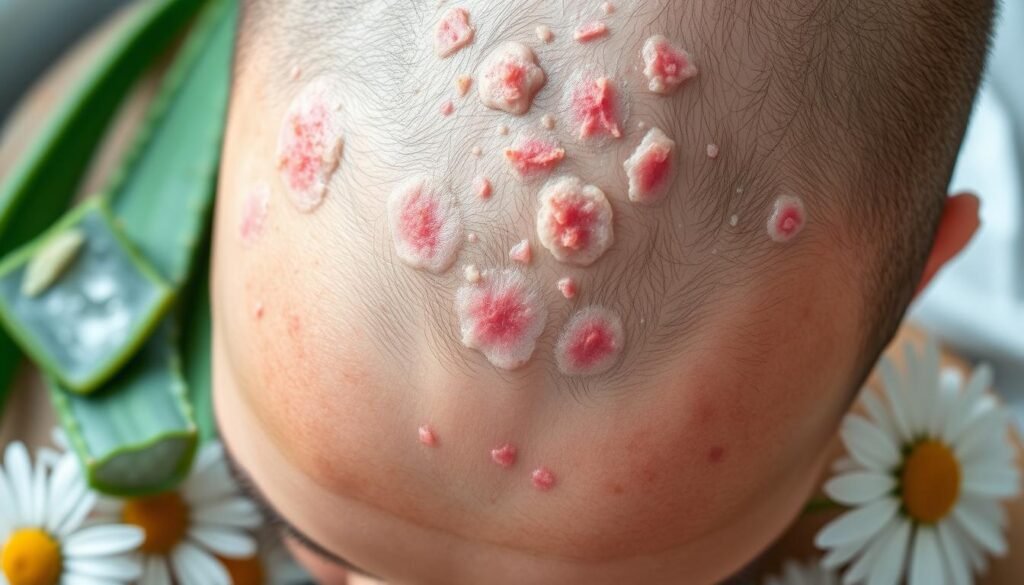About half of all people will experience dandruff. It’s not just an annoying issue involving itching and flaking. It can also hurt how people feel about themselves, affecting their confidence. Knowing how to take care of your scalp is key. This means finding the right treatments and ways to prevent it. We’ll cover everything from why dandruff happens to expert advice on keeping it under control.
Key Takeaways
- Dandruff affects nearly half of the population at some time.
- It can affect self-esteem and personal confidence.
- Effective scalp care is vital for managing dandruff.
- Understanding the root causes can aid in treatment and prevention.
- Natural remedies and lifestyle changes can be beneficial.
- Choosing the right hair products is essential for prevention.
Understanding Dandruff
Dandruff is a common issue where the scalp’s skin flakes off. It can make your scalp itch and cause embarrassment. It’s important to know about dandruff and causes of dandruff.
What is Dandruff?
Dandruff shows up as white or yellowish tiny flakes in your hair or scalp. These flakes may end up on your clothes or stay on your head. Even though it’s not serious, dandruff can be annoying for anyone.
Common Causes of Dandruff
Many things can make dandruff happen, such as:
- Dry skin
- Seborrheic dermatitis
- Fungal infections
- Sensitivity to hair products
Often, people don’t think about how the environment or the products they use impact dandruff. What you eat and how well you take care of your scalp also matter. For more info, check out this source.
Types of Dandruff
Here are the main types of dandruff:
| Type | Appearance | Characteristics |
|---|---|---|
| Dry Dandruff | Small, white flakes | Usually comes from dry skin needing moisture |
| Oily Dandruff | Larger, yellowish flakes | Linked to too much oil and seborrheic dermatitis |
Knowing the kind of dandruff you have helps pick the right treatment. It’s key to tackle dandruff correctly.
Dandruff and Scalp Care
Knowing how to keep your scalp clean is key to beating dandruff. A healthy scalp means healthy hair. It also cuts down on the itchiness and flakes dandruff causes. With the right scalp care habits, your hair can look and feel better.
Importance of Scalp Hygiene
Keep your scalp clean to stop dandruff from getting worse. Washing your hair regularly gets rid of oil, dirt, and dead skin. This keeps your scalp fresh. A clean scalp means your hair can grow strong without fungal infections that cause dandruff.
Best Practices for Scalp Care
Good scalp care habits make a big difference:
- Shampoo often to clean away oil and dirt.
- Pick mild, sulfate-free shampoos to keep your scalp happy.
- Gently massage your scalp when you wash your hair. This boosts blood flow.
- Use moisturizing treatments to keep your scalp balanced.
- Avoid too much heat styling to prevent dryness and damage.
Following these steps will improve your scalp care and reduce dandruff. Sticking to a regular routine will make your scalp healthier. This leads to better hair health too.
Identifying Flaky and Dry Scalp
It’s important to know the symptoms of a flaky and dry scalp. This knowledge helps in finding the right treatment. Knowing the differences also helps in choosing the best care.
Symptoms of Flaky Scalp
Symptoms of a flaky scalp are specific. People may notice:
- Itching that can be annoying, ranging from mild to severe.
- Irritation on the scalp, sometimes with redness.
- Visible flakes on the hair or clothes, which can be embarrassing.
- Dry patches that feel rough or uneven.
Differences Between Flaky and Dry Scalp
Understanding how a flaky scalp is different from a dry scalp is helpful. Here’s what sets them apart:
| Feature | Flaky Scalp | Dry Scalp |
|---|---|---|
| Common Symptoms | Itching, irritation, visible flakes | Flaking skin, tightness, lack of moisture |
| Underlying Causes | May suggest conditions like seborrheic dermatitis or psoriasis | Often due to environmental factors like weather changes |
| Treatment Approach | Could need medicated shampoos and a doctor’s advice | Usually fixed with moisturizing products |

Managing an Itchy Scalp
An itchy scalp can make you feel uncomfortable. It happens for many causes. To fix it, you need to know why it’s happening. Itchy scalp can come from dry skin, bad reactions to hair products, or infections.
Causes of Itchy Scalp
Many things can make your scalp itch. These are:
- Dry skin: Dry air can make your scalp dry.
- Allergy to hair products: Some hair products have things that can irritate your skin.
- Scalp infections: Illnesses like tinea capitis or seborrheic dermatitis can make your scalp itch.
- Head lice: These bugs can cause a lot of itching.
You can find out more by checking this resource. It talks about causes and how to treat them.
Effective Remedies for Itchy Scalp
There are ways to soothe an itchy scalp. Here are some:
- Medicated shampoos: Shampoos with ketoconazole or salicylic acid can help.
- Soothing oils: Oils like tea tree or coconut oil can ease dryness and irritation.
- Maintaining proper scalp hygiene: Washing your hair with mild products prevents buildup.
Caring for your skin and practicing good habits is key. The right remedies greatly improve comfort and scalp health.
Popular Anti-Dandruff Shampoos
Finding the right anti-dandruff shampoo is key for managing dandruff well. Many reputable brands offer solutions. Some popular ones include Head & Shoulders, Nizoral, and Selsun Blue. They offer unique benefits for different dandruff problems.
Head & Shoulders: Overview and Benefits
Head & Shoulders is famous for fighting dandruff. It uses zinc pyrithione to combat the fungus causing dandruff. Not only does it relieve symptoms, but it also helps keep the scalp healthy. People like its nice smell and how it makes hair feel clean.
Nizoral: Key Ingredients and Effects
Nizoral stands out with ketoconazole, a strong antifungal ingredient. It goes after dandruff’s root causes. This helps with flakes and irritation. Nizoral is perfect for those with tough dandruff. Using it regularly makes the scalp better.
Selsun Blue: How It Works Against Dandruff
Selsun Blue uses selenium sulfide to fight dandruff effectively. It slows down skin cell turnover on the scalp. This means less flaking and itching. Users find Selsun Blue easy to use with fast results. It’s great for oily scalps or serious dandruff.
| Shampoo | Active Ingredient | Benefits |
|---|---|---|
| Head & Shoulders | Zinc Pyrithione | Combats dandruff and soothes scalp |
| Nizoral | Ketoconazole | Effective against severe dandruff |
| Selsun Blue | Selenium Sulfide | Reduces skin cell turnover, minimizes flakes |
Different options help people find the best shampoo for their needs. For deep dives into dandruff solutions, looking at the best dandruff shampoos is helpful. Understanding dandruff causes is also key; learn more at Dandruff causes and symptoms.
Dandruff: Additional Information
Seborrheic dermatitis is a serious type of dandruff. It makes people feel uncomfortable and self-aware. The skin gets red and oily, covered with yellowish scales. Knowing about this condition helps manage severe dandruff better. It allows for more effective treatment and care.
Understanding Seborrheic Dermatitis
Seborrheic dermatitis is not just regular dandruff. It appears in oily skin areas, causing flaking and irritation. If your skin feels dry but flakes off, it might be this condition. Recognizing this can help you find relief with the right treatment.
When to Consult a Dermatologist
It’s vital to know when to see a dermatologist for seborrheic dermatitis. Look for help if you have:
- Intense itching that affects your daily life
- Long-lasting symptoms that don’t get better with store-bought products
- Signs of skin issues like redness or swelling
Watching for these symptoms allows you to get help sooner. A dermatologist can offer strong treatments for seborrheic dermatitis.

Natural Remedies for Dandruff
Looking into natural ways to fight dandruff can give great results without harsh chemicals. Essential oils are a key player for fixing scalp health and easing symptoms. Your diet also has a big part in cutting down dandruff, thanks to good nutrition.
Essential Oils for Scalp Health
Using essential oils is a soft yet strong method to beat dandruff. Two oils really stand out:
- Tea Tree Oil: Famous for stopping fungus growth. It’s good for lessening scalp flakes.
- Lavender Oil: It eases scalp stress and itchiness. Plus, it smells good, making hair care fun.
Adding these oils to a scalp rub or a DIY hair mask can help a lot. Mix with a carrier oil for safe and best results.
Diet and Nutrition Considerations
The role of diet in fighting dandruff is not to be overlooked. A good diet aims at nutrients that boost skin health and fight inflammation. Important food elements include:
- Omega-3 Fatty Acids: Found in fish, flaxseeds, and walnuts, they help keep the scalp moist.
- Vitamins: Vitamins A, D, and E are key for healthy skin. Eat more greens, nuts, and fish.
- Minerals: Zinc keeps hair follicles healthy, selenium guards the scalp. Sunflower seeds and whole grains are good sources.
Choosing these nutrients carefully in your daily diet can improve your scalp health and reduce dandruff. Combining natural treatments with nutritious eating lets you tackle dandruff confidently.
| Essential Oils | Benefits |
|---|---|
| Tea Tree Oil | Antifungal properties help control dandruff-causing fungi. |
| Lavender Oil | Soothes the scalp, reducing irritation and promoting relaxation. |
Preventing Dandruff Recurrence
To keep a healthy scalp and fight off dandruff, changing your lifestyle is key. Small tweaks in your daily routine can make a big difference for your hair’s health. It’s also important to pick hair products that match what you need for fighting dandruff.
Lifestyle Changes to Consider
To stop dandruff before it starts, think about making some lifestyle changes. Here are a few tips:
- Manage Stress: Stress can make dandruff worse. Try doing yoga or meditating to relax.
- Maintain a Balanced Diet: Eating foods rich in vitamins helps your scalp stay healthy. Zinc and omega-3 fats are especially good for a strong scalp.
- Avoid Harsh Chemicals: Some hair care products have strong chemicals that irritate the scalp. Use gentle, sulfate-free shampoos to keep your scalp healthy.
Choosing the Right Hair Products
Using the right products for your scalp type is key to dandruff prevention. Check out these suggestions:
| Hair Type | Recommended Products | Key Ingredients |
|---|---|---|
| Oily Scalp | Neutrogena T/Gel | Coal tar extract |
| Dry Scalp | OGX Hydrating Tea Tree Mint Shampoo | Tea tree oil, mint |
| Normal Scalp | Paul Mitchell Tea Tree Shampoo | Tea tree oil, peppermint |
Conclusion
Ending our talk on tackling dandruff, it’s key to know what causes it to treat it right. A healthy scalp needs regular attention and smart choices. By understanding the different causes and types of dandruff, people can choose how to take care of their scalp better.
To get ahead of dandruff, using good shampoos like Head & Shoulders, Nizoral, or Selsun Blue helps a lot. The tips we’ve shared show how to keep your scalp clean and know what triggers dandruff. This advice aims to help you face dandruff with certainty.
Changing your lifestyle also stops dandruff from coming back. Paying attention to what you eat, how you care for your hair, and treating your scalp well makes a huge difference. This wrap-up on fighting dandruff hopes to make readers feel ready to improve their scalp health with confidence.